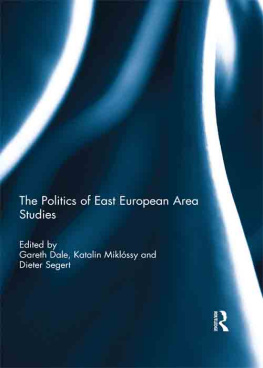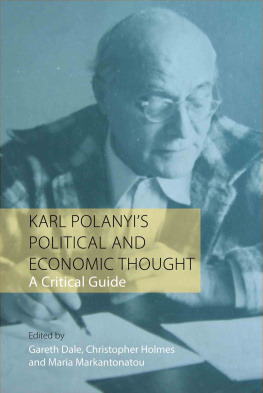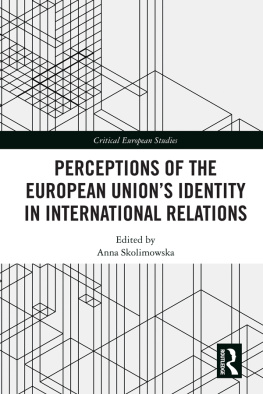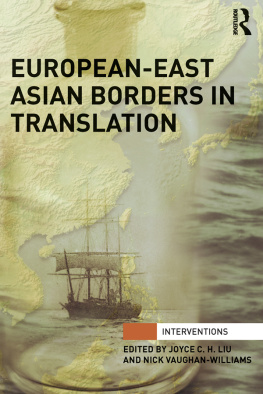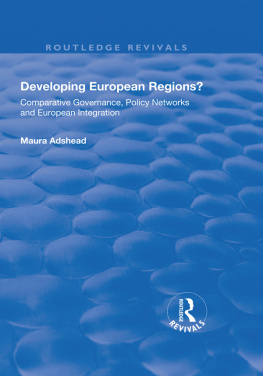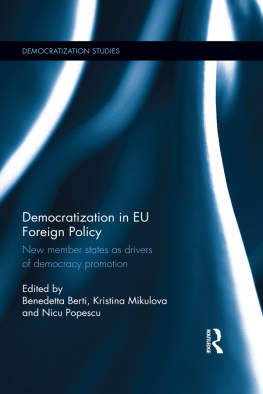The Politics of East European Area Studies
Following the end of the Cold War and European Union enlargement, in what sense does Eastern Europe continue to exist as a meaningful geo-political concept? In addressing this question, contributors to this volume Robert Bideleux, Alex Cistelecan, Katalin Miklssy and Dieter Segert tease out the implications for an Area Studies approach to the region. They examine its contradictory situation within discourses of orientalization: on one hand, posited as the underdeveloped pendant to its western neighbours; on the other, largely Christian by religion and an integral part of a continent that dominated the world. They uncover the roots of area studies in the colonial paradigm by which great powers promote the creation of predictive, problem-solving knowledge that is immediately apprehendable for decision-makers, helping them to take advantage of a regions resources and strategic position, but which tends to homogenize the regions geography and history. For critical inquiry, they argue, the challenge is to delineate transparently the reasons underlying Eastern Europes construction as an area of study, to identify the epistemological interests of motivated organizations such as funding agencies and political bodies, and to counter the ongoing orientalism of Western perspectives toward the East.
This book was originally published as a special issue of the Journal of Contemporary Central and Eastern Europe.
Gareth Dale teaches Politics at Brunel University. He has published on Karl Polanyi, Eastern Europe and the GDR, green growth and international migration. Recent publications include First the Transition, then the Crash: Eastern Europe in the 2000s (2011) and Karl Polanyi: The Limits of the Market (2010).
Katalin Miklssy teaches Eastern European Area Studies at the University of Helsinki, with a particular focus on issues related to democratisation. She has published on competition, modernization and Cold War interactions regarding East Central European countries.
Dieter Segert teaches Eastern European Area Studies at Vienna University. He has published chapters and articles in numerous books and journals on state socialism and its legacy, democracy and party politics.
The Politics of East European Area Studies
Edited by
Gareth Dale, Katalin Miklssy and Dieter Segert
First published 2016
by Routledge
2 Park Square, Milton Park, Abingdon, Oxon, OX14 4RN, UK
and by Routledge
711 Third Avenue, New York, NY 10017, USA
Routledge is an imprint of the Taylor & Francis Group, an informa business
2016 Taylor & Francis
All rights reserved. No part of this book may be reprinted or reproduced or utilised in any form or by any electronic, mechanical, or other means, now known or hereafter invented, including photocopying and recording, or in any information storage or retrieval system, without permission in writing from the publishers.
Trademark notice: Product or corporate names may be trademarks or registered trademarks, and are used only for identification and explanation without intent to infringe.
British Library Cataloguing in Publication Data
A catalogue record for this book is available from the British Library
ISBN 13: 978-1-138-65330-6
Typeset in TrebuchetMS
by RefineCatch Limited, Bungay, Suffolk
Publishers Note
The publisher accepts responsibility for any inconsistencies that may have arisen during the conversion of this book from journal articles to book chapters, namely the possible inclusion of journal terminology.
Disclaimer
Every effort has been made to contact copyright holders for their permission to reprint material in this book. The publishers would be grateful to hear from any copyright holder who is not here acknowledged and will undertake to rectify any errors or omissions in future editions of this book.
Contents
Gareth Dale, Katalin Miklssy and Dieter Segert
Robert Bideleux
Alex Cistelecan
Katalin Miklssy
Dieter Segert
The following chapters were originally published in the Journal of Contemporary Central and Eastern Europe, volume 23, issue 1 (April 2015). When citing this material, please use the original page numbering for each article, as follows:
Chapter 2
The Orientalization and de-Orientalization of East Central Europe and the Balkan Peninsula
Robert Bideleux
Journal of Contemporary Central and Eastern Europe, volume 23, issue 1 (April 2015) pp. 9-44
Chapter 3
From Region to Culture, from Culture to Class
Alex Cistelecan
Journal of Contemporary Central and Eastern Europe, volume 23, issue 1 (April 2015) pp. 45-60
Chapter 4
Russian and East European Studies with a Finnish Flavour
Katalin Miklssy
Journal of Contemporary Central and Eastern Europe, volume 23, issue 1 (April 2015) pp. 61-80
Chapter 5
Is There Really Something Like Eastern Europe? And If So, Why Do We Need Area Studies of It?
Dieter Segert
Journal of Contemporary Central and Eastern Europe, volume 23, issue 1 (April 2015) pp. 81-96
For any permission-related enquiries please visit: http://www.tandfonline.com/page/help/permissions
Robert Bideleux is a reader (associate professor) in Politics and International Relations at Swansea University, UK. His main publications are Communism and Development (Routledge, 2014), (with Ian Jeffries) A History of Eastern Europe (Routledge, 2007) and The Balkans: a Post-Communist History (Routledge, 2007). He runs a PPE degree programme and teaches and researches on political economy, history of economic thought, European integration, governance, Central and East Europe, Brazil, post-colonialism and genocide.
Alex Cistelecan is a lecturer at Petru Maior University, Romania, and editor at criticatac.ro.
Gareth Dale teaches Politics at Brunel University. He has published on Karl Polanyi, Eastern Europe and the GDR, green growth and international migration. Recent publications include First the Transition, then the Crash: Eastern Europe in the 2000s (2011) and Karl Polanyi: The Limits of the Market (2010).
Katalin Miklssy teaches Eastern European Area Studies at the University of Helsinki, with a particular focus on issues related to democratization. She has published on competition, modernization and Cold War interactions regarding East Central European countries.
Dieter Segert teaches Eastern European Area Studies at Vienna University. He has published chapters and articles in numerous books and journals on state socialism and its legacy, democracy and party politics.
Gareth Dale, Katalin Miklssy and Dieter Segert
Area Studies are on the verge of change. Inherited concepts that once served to aggregate countries within regions are being re-examined, as is the art of studying them. This volume explores the construction and present existence of Eastern Europe: where it is situated, what are the fundaments of its identity and how it has been apprehended as a subject of area studies analysis. Four authors Robert Bideleux, Alex Cistelecan, Katalin Miklssy and Dieter Segert seek to make sense of the political and cultural identity of Eastern Europe in the current conjuncture. Following the end of the Cold War and the ongoing process of EU enlargement, they ask in what sense does Eastern Europe continue to exist as a meaningful geopolitical concept? With its western segments subsumed within the European Union, have all salient commonalities with the rest disappeared except insofar as they too aspire to membership of the club? In addressing these questions, they tease out the implications for an Area Studies approach to the region, asking how the nature and evolution of Area Studies has affected the scholarly lens. In this introduction, we sketch the terrain of this debate, situating the major topics to be explored in the chapters that follow.


